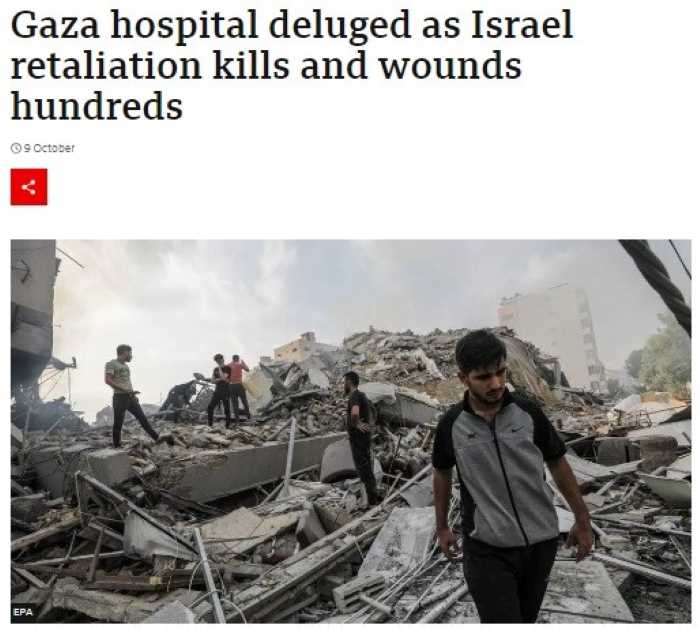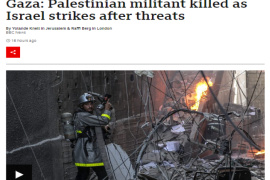Since October 7th the Barzilai Medical Centre – Ashkelon’s main hospital – has been hit by rockets launched from the Gaza Strip on at least two occasions to date. Severe damage was caused to a bridge connecting two of the hospital’s departments early on October 8th and to a childcare clinic on October 11th. Nevertheless, the hospital has treated over seven hundred of the more than 3,500 people wounded in Hamas’ ground invasion and rocket attacks.
On the morning of October 8th the BBC News website published a report from Ashkelon by Yolande Knell titled “‘Nobody could help us’ – Shock and anger in Israel’s Ashkelon”. No mention is made of the rocket which had hit the Barzilai Medical Centre several hours earlier even though Knell visited that location: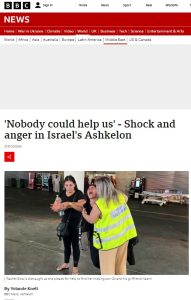
“The only small crowds we encounter are by the Barzilai Medical Center. Weary medics stand by the entrance to the emergency ward. They have treated more than 400 patients because of the surprise attack by Hamas, the militant group which governs Gaza.
“It was very difficult, a lot of casualties have been brought one after one, one after one very quickly,” says the hospital’s general director, Prof Hezi Levy. “I am very experienced, but I haven’t seen in my life such a scenario.””
Moreover, Knell closes that report with two paragraphs relating to rocket interceptions:
“Overhead, there are regular booms as Israel’s Iron Dome missile defence system intercepts rockets which have been fired by Palestinian militants.
It has protected residents through many previous rounds of fighting with Hamas. But right now, nobody in Ashkelon feels very safe.”
That article by Knell is the only item of “permanent public record” content published on the BBC News website to date which includes reporting from any of the hospitals in Israel treating those wounded in Hamas’ unprecedented attacks. Audiences have seen no coverage of the ambulance drivers, paramedics and doctors murdered by Hamas terrorists.
However, visitors to the website have to date seen at least twelve filmed and written items relating to or mentioning hospitals and medical staff in the Gaza Strip.
October 7th: Israel attack: PM says Israel at war after 250 killed in attack from Gaza, Yolande Knell, Raffi Berg and David Gritten.
“Medical aid group Medecins Sans Frontieres said a nurse and an ambulance driver were killed in Israeli strikes on two hospitals in Gaza.”
October 9th: Gaza hospital deluged as Israel retaliation kills and wounds hundreds, Rushdi Abualouf.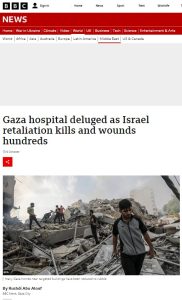
“The escalation has made Gaza’s dreadful humanitarian situation even worse.
Its under-equipped hospitals – which at the best of times struggle to provide healthcare to a population of more than two million people – have launched desperate appeals for blood donors.
Mahmoud Shalabi, Gaza director of the charity Medical Aid for Palestinians, described the city’s main hospital as a “slaughterhouse”.”
October 9th: Gaza ‘soon without fuel, medicine and food’ – Israel authorities, Rushdi Abualouf and Oliver Slow.
“Stéphane Dujarric, spokesman for the UN secretary-general, said more than a dozen healthcare workers had been killed or injured and at least seven medical centres had been damaged.”
“In a statement released before those announcements, the Palestinian health ministry said hospitals were facing a shortage of medicines, medical supplies and fuel due to Israel’s actions.”
October 9th: Explosions as surgeon stuck in Gaza interviewed
October 10th: Doctor in Gaza: I woke up to sounds of explosions, Derek Cai.
“A British surgeon on a charity trip to Gaza has described how constant shelling from Israel forced him to cancel all his scheduled operations.”
October 12th: Gaza hospitals risk turning into morgues, Red Cross says, Rushdi Abualouf and George Wright.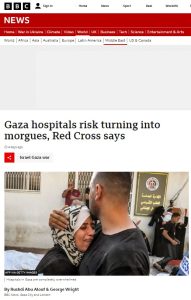
“Hospitals in Gaza risk turning into morgues without electricity, the International Committee of the Red Cross (ICRC) says.
Gaza’s only power plant ran out of fuel on Wednesday, and back-up generators could stop working in hours, it adds.
Medical centres have been overwhelmed after Israel imposed a “complete siege” on Gaza and pounded the territory with air and artillery strikes.”
October 13th: BBC crew find injured friends in overrun Gaza hospital, Adnan Elbursh.
“Gaza City’s main hospital, Al Shifa, is at breaking point, with hundreds of seriously injured people filling the hallways and bodies lying in corridors and outside, as staff work under immense pressure.”
October 13th: Bodies line corridors as Gaza hospital warns it’s at breaking point, Adnan Elbursh.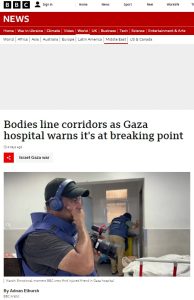
“Gaza City’s main hospital, Al Shifa, is at full capacity.
The hallways and courtyards are filled with hundreds of bodies, as the morgue’s refrigerators cannot hold them all. More bodies still lie outside.
Inside, hundreds of seriously injured people fill the hallways as staff work under immense pressure, knowing that all services might soon grind to a halt if its back-up generators stop working. Women and children are among the wounded.
This could lead to a serious catastrophe.”
October 15th: Gaza Strip in maps: What it’s like for the people who live there
“Gaza’s sole power plant stopped working after running out of fuel on 11 October, leaving hospitals overwhelmed with injured relying on back-up generators. Some hospitals with limited stores are expected to run out of fuel within days.”
Section titled “Health service under strain”.
October 15th: BBC in Khan Younis: The scene is tragic, Rushdi Abualouf reporting from hospital.
October 15th: Khan Younis: A Gaza city on its knees, now with a million mouths to feed, Rushdi Abualouf.
“The main hospital here, already low on essentials, has not only taken in sick and injured from the north – it has now become a refuge.
Refugees line the corridors as doctors work on new arrivals injured by Israeli bombs. The din of competing voices fills the air.
You cannot blame people for coming here.
Hospitals are among the safest places to be in a time of war, protected by international law. […]
I heard rocket launches from near the hospital, as Hamas continues to strike inside Israel. That is an open invitation for retaliation.” [emphasis added]
October 16th: Gaza doctor: We consume a month’s medical supplies a day
“British Palestinian Surgeon, Prof Ghassan Abu-Sittah, describes the “overwhelming” numbers of wounded coming to Gaza’s Al-Shifa hospital.
“Every five minutes, there’s a new ambulance coming in,” he says.”
Remarkably, despite producing multiple reports from Gaza City’s Shifa hospital, the BBC has refrained from reminding readers and viewers that – as it well knows – senior Hamas officials have hidden in that hospital and others during past rounds of hostilities. Hamas’ practice of using hospitals and their vicinity as command and control centres and sites for launching missile attacks on Israel has not been reported to BBC audiences beyond that vague allusion to rocket fire in Abualouf’s October 15th report from Khan Younis. Hamas’ known use of ambulances for the purposes of terrorism has also not been mentioned.
None of the BBC’s reports informs audiences that the Gaza “health officials” quoted in some items are linked to the health ministry run by the terrorist organisation Hamas which decided to initiate this round of violence or that the casualty figures provided by those sources intentionally do not distinguish between combatants and civilians.
As we see, the BBC cannot possibly claim to have provided its audiences with balanced, accurate or impartial reporting on the topic of hospitals in Israel and the Gaza Strip.
Note: This report was written before the October 17th incident at Al Ahli hospital in Gaza City, BBC coverage of which will be discussed in a future post.
Related Articles:
BBC WS RADIO GAZA STRIP REPORTS DEMONSTRATE IMPARTIALITY FAILINGS
BBC RETURNS TO ITS OLD MODUS OPERANDI ON GAZA CASUALTY FIGURES
BBC FILMS HAMAS HUMAN SHIELDS POLICY IN ACTION: FAILS TO EXPLAIN TO AUDIENCES

